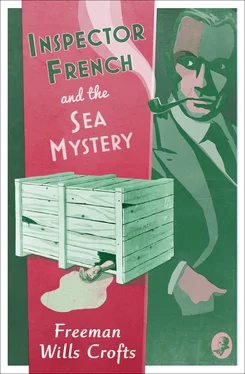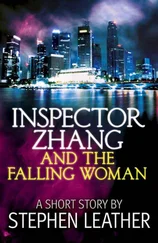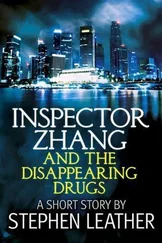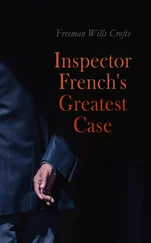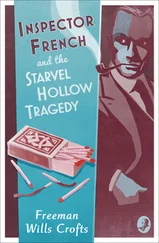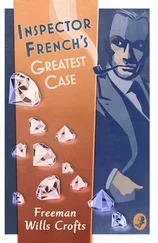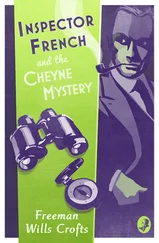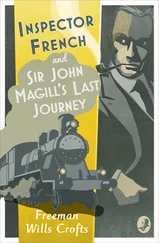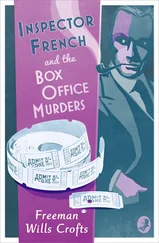French wondered if he could get anything from these considerations. He turned to Manners.
‘I suppose it takes a bit of time to get up a good run in an estuary like this? How soon after high water would you say the current was running at full speed under the bridge?’
‘From one to two hours, more or less.’
One to two hours previous to the period 2 to 4 a.m. meant between midnight and 3 a.m.
‘Now, Mr Manners, can you tell me whether high water fell between twelve and three on any night about five or six weeks ago?’
Manners once more produced his tide table.
‘Five or six weeks ago,’ he repeated slowly. ‘That would be between the 16th and the 23rd of August.’ He ran his stubby finger up the pages, then read out: ‘“21st, Sunday, 0.5—” that’s five minutes past midnight, you understand. “22nd, Monday, 1.23 a.m.; 23rd, Tuesday, 2.55. a.m.” ’Ow would that suit you, sir?’
‘All right, I think,’ French answered, as he noted the three dates. ‘Any of those top springs?’
‘No, sir, you don’t get ’igh water of springs at night. ’Bout six or seven o’clock it runs. Those dates wot I gave you are about dead neaps.’
‘But there is still a strong flow at neaps?’
‘Oh, bless you, yes. Not so strong as at springs o’ course, but plenty strong enough.’
All this seemed satisfactory to French, and he felt a growing conviction that the small hours of the 21st, 22nd, or 23rd of August had witnessed the launch of the crate. But this was mere theory, and theory is popularly admitted to be worth only one-sixteenth of the value of practice. Could he not arrive at something more definite?
Suddenly he thought he saw his way.
‘You say it was neap tides on those three dates in August? What rise and fall does that represent?’
‘’Bout eighteen feet.’
‘How soon shall we have that again?’
‘Not for nearly a week we shan’t. Say next Monday.’
‘I can’t wait for that. What’s the rise tomorrow?’
‘Twenty-one foot eleven.’
‘And what hour is high water?’
‘Eight o’clock in the morning.’
‘That’ll have to do. Look, here is a bus labelled “Llanelly.” Let us get aboard.’
At the police station they found not only the superintendent, but Chief Constable Lloyd.
‘Glad to see you together, gentlemen,’ French greeted them. ‘I’ve been going into the matter of tides and currents in the Inlet with Mr Manners here, and now I want your help in trying an experiment. Manners informs me that about six weeks ago, the time at which the doctors believe our man was murdered, it was high water in the dead period of the night. Tomorrow, Thursday, it will be high water at 8. a.m. The maximum run out to sea, Manners says, will begin between one and two hours later, say at 9.30 a.m. Now, gentlemen, I want to load the crate with a weight equal to that of the body and throw it into the estuary from the Loughor bridge at 9.30 tomorrow morning. Will you help me?’
While French had been speaking the three men had stared uncomprehendingly, but as he reached his peroration something like admiration showed on their faces.
‘Well, I’m blessed,’ the superintendent said slowly, while Major Lloyd gave the suggestion his instant approval.
‘Glad you agree, gentlemen,’ said French. ‘Now, if we’re to be ready, we shall want a few things arranged. First we’ll have to put stones in the crate to equal the weight of the body. Then we’ll want a carpenter to repair the top where Mr Morgan broke it. He’ll have to make it water-tight with pitch or putty or something. I don’t want it to take any water through the cracks. A lorry will also be needed to carry the crate to the bridge, and three or four men to lift it over the parapet.’
‘Very good,’ the chief constable answered. ‘Nield can arrange all that. Advise him, will you, Superintendent. But you’d better see him yourself, Inspector, and make sure he forgets nothing. Anything else?’
‘Yes, sir. We don’t want to lose the crate. We shall want a rope round it and a boat in attendance.’
‘You can fix that up, Manners, can’t you?’
‘Certainly, sir. I’ll see to it.’
‘Good. I’ll come down to watch the experiment. Shall we say 9.30 a.m. at the bridge?’
At nine o’clock next morning two vehicles left the Burry Port police station. The first was a lorry and on it stood the crate, repaired and loaded with the necessary weight of shingle, due allowance having been made for the fact that the wood was now waterlogged. Behind followed a car containing French, Nield, and three constables in plain clothes.
The weather was ideal for their purpose. The fine spell had lasted and the sun shone with a summery warmth and brilliance. Not a breath of wind dulled the shining surface of the Inlet, now calm and placid at the turn of the tide. Inland the hills showed sharp against the clear blue of the sky. Out beyond the Gower Peninsula was a steamer going up to Swansea or Cardiff.
The chief constable and Superintendent Griffiths were waiting for them at Loughor. Already the tide was running swiftly, swirling and eddying round the piles of the bridge. Moored to the bank at the east end was a broad-beamed boat with Manners in the sternsheets and two oarsmen amidships.
‘Good heavens, they’ll never row against that current!’ French exclaimed, aghast at the rushing flood.
‘They’re not going to try,’ Nield declared. ‘This is what I’ve arranged with Manners. He has an extra long painter fixed to his boat. We’ll get the end up on the bridge and tie it to the Crate. Then we’ll throw crate and rope over together, and Manners can pull the slack of the rope into the boat and float down beside the crate.’
‘Right. Let me get into the boat first and then carry on.’
French scrambled down the stone pitching of the bank and with some difficulty got aboard. The rope had been passed up to the bridge and was now worked across till the boat was nearly in mid-stream. Even with the help of the oarsmen it was all those above could do to hold on. Then the crate appeared rising slowly on to the parapet. Presently it turned over and fell, the rope being thrown clear at the same time.
The crate entered the water with a mighty splash, drenching the boat with spray and disappearing momentarily beneath the surface. Then it came up again, and bobbing about like some ungainly animal, began to move quickly downstream. The boatmen rowed after it, while Manners hurriedly pulled in the slack of the rope.
After the first few plunges the crate settled down on what might be called an even keel, floating placidly down the estuary. They were rapidly approaching the railway bridge, the roar of the water through the piles being already audible. The passage was not without danger, and the oarsmen worked hard to keep the boat clear of the piles and to ensure its passing through the same opening as the crate. Then with a rush they were through and floating in the calm water beyond.
French enjoyed that unconventional trip down the Inlet. Apart from the interest of the quest, the glorious weather and the charming scenery made it a delightful excursion. Borne on by the current they first hugged the salt marshes of the northern shore, then heading out towards mid-channel, they passed the post on Careg-ddu and rounded the point at the Llanelly rifle range. They kept inside the long training bank or breakwater, and passing the entrance to Llanelly harbour, stood out towards the open sea. From the water the high lands north and south looked rugged and picturesque, and even the dingy buildings of the town became idealised and seemed to fit their setting. French took frequent bearings so as to be able to plot their course on the map.
Читать дальше
